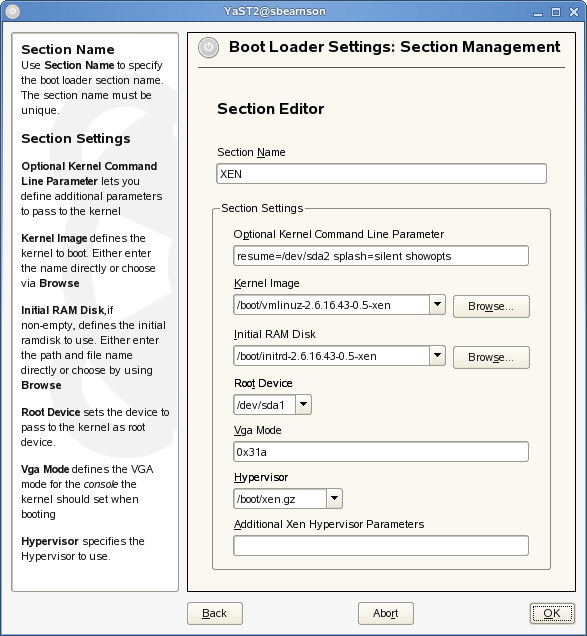1.4 Setting Up a 32-Bit Domain 0 on a 64-Bit Hypervisor
A virtual machine host running on a 64-bit platform can access much more memory than one running on a 32-bit platform. However, there might be circumstances where you want to run the 32-bit version of the SUSE® Linux operating system (as domain 0) on the 64-bit Xen hypervisor.
-
On 64-bit hardware, start the 32-bit SUSE Linux operating system installation program.
-
On the screen, edit the category so it includes the software package selection.
-
On the > screen, click to view all packages.
-
In the drop-down list, select , then search for kernel-xen. Make sure that kernel-xenpae is selected for installation and that kernel-xen is not selected.
-
Complete the SUSE Linux installation program.
The installation program copies files, reboots, and prompts you for additional setup information.
-
After entering the additional setup information, log in to the computer.
-
Access the SUSE Linux installation source media.
The 64-bit Xen hypervisor RPM is included in both 32-bit and 64-bit versions of the SUSE Linux installation media.
-
On the SUSE Linux installation source media, find the x86_64 directory that contains xen.rpm.
-
Use the following command to install the RPM:
rpm -U xen.rpm --ignorearch --force
-
Edit the GRUB boot loader settings by running > > or editing the file at /boot/grub/menu.lst.

-
Change Hypervisor to /boot/xen.gz.
The xen.gz hypervisor is the 64-bit hypervisor.
-
Reboot the computer.
-
During the boot process, select the Xen option from the GRUB boot loader.
-
Verify that the computer is running the 32-bit Domain 0 by entering:
uname -m
It should report a 32-bit machine name, such as i686.
-
Verify that the computer is running the 64-bit hypervisor by entering:
xm info | grep xen_caps
It should report a 64-bit Xen hypervisor, such as xen-3.0-x86_64.